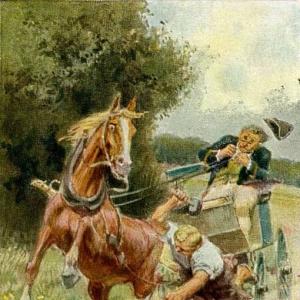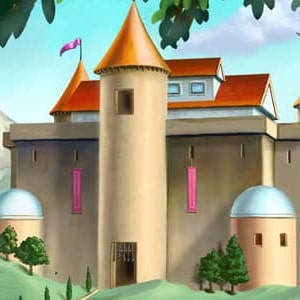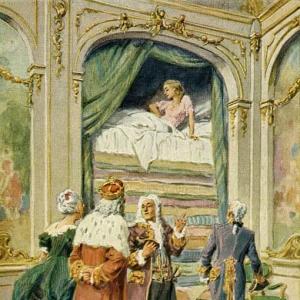Reading time for children: 15 min
There was once a man who understood all kinds of arts. He served in war, and behaved well and bravely, but when the war was over he received his dismissal, and three farthings for his expenses on the way. „Stop,“ said he, „I shall not be content with this. If I can only meet with the right people, the King will yet have to give me all the treasure of the country.“ Then full of anger he went into the forest, and saw a man standing therein who had plucked up six trees as if they were blades of corn.
He said to him, „Wilt thou be my servant and go with me?“ – „Yes,“ he answered, „but, first, I will take this little bundle of sticks home to my mother,“ and he took one of the trees, and wrapped it round the five others, lifted the bundle on his back, and carried it away. Then he returned and went with his master, who said, „We two ought to be able to get through the world very well,“ and when they had walked on for a short while they found a huntsman who was kneeling, had shouldered his gun, and was about to fire.
The master said to him, „Huntsman, what art thou going to shoot?“ He answered, „Two miles from here a fly is sitting on the branch of an oak-tree, and I want to shoot its left eye out.“ – „Oh, come with me,“ said the man, „if we three are together, we certainly ought to be able to get on in the world!“ The huntsman was ready, and went with him, and they came to seven windmills whose sails were turning round with great speed, and yet no wind was blowing either on the right or the left, and no leaf was stirring.
Then said the man, „I know not what is driving the windmills, not a breath of air is stirring,“ and he went onwards with his servants, and when they had walked two miles they saw a man sitting on a tree who was shutting one nostril, and blowing out of the other. „Good gracious! what are you doing up there?“ He answered, „Two miles from here are seven windmills. Look, I am blowing them till they turn round.“ – „Oh, come with me,“ said the man. „If we four are together, we shall carry the whole world before us!“
Then the blower came down and went with him, and after a while they saw a man who was standing on one leg and had taken off the other, and laid it beside him. Then the master said, „You have arranged things very comfortably to have a rest.“ – „I am a runner,“ he replied, „and to stop myself running far too fast, I have taken off one of my legs, for if I run with both, I go quicker than any bird can fly.“ – „Oh, go with me. If we five are together, we shall carry the whole world before us.“ So he went with them, and it was not long before they met a man who wore a cap, but had put it quite on one ear.
Then the master said to him, „Gracefully, gracefully, don’t stick your cap on one ear, you look just like a tom-fool!“ – „I must not wear it otherwise,“ said he, „for if I set my hat straight, a terrible frost comes on, and all the birds in the air are frozen, and drop dead on the ground.“ – „Oh, come with me,“ said the master. „If we six are together, we can carry the whole world before us.“ Now the six came to a town where the King had proclaimed that whosoever ran a race with his daughter and won the victory, should be her husband, but whosoever lost it, must lose his head.
Then the man presented himself and said, „I will, however, let my servant run for me.“ The King replied, „Then his life also must be staked, so that his head and thine are both set on the victory.“ When that was settled and made secure, the man buckled the other leg on the runner, and said to him, „Now be nimble, and help us to win.“ It was fixed that the one who was first to bring some water from a far distant well was to be the victor. The runner received a pitcher, and the King’s daughter one too, and they began to run at the same time, but in an instant, when the King’s daughter had got a very little way, the people who were looking on could see no more of the runner, and it was just as if the wind had whistled by.
In a short time he reached the well, filled his pitcher with water, and turned back. Half-way home, however, he was overcome with fatigue, and set his pitcher down, lay down himself, and fell asleep. He had, however, made a pillow of a horse’s skull which was lying on the ground, in order that he might lie uncomfortably, and soon wake up again.
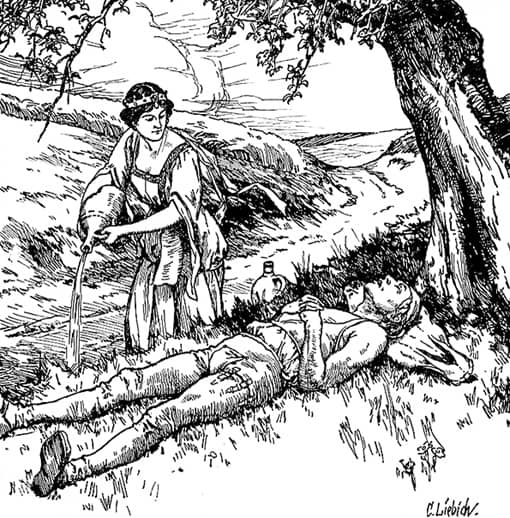
In the meantime the King’s daughter, who could also run very well quite as well as any ordinary mortal can had reached the well, and was hurrying back with her pitcher full of water, and when she saw the runner lying there asleep, she was glad and said, „My enemy is delivered over into my hands,“ emptied his pitcher, and ran on. And now all would have been lost if by good luck the huntsman had not been standing at the top of the castle, and had not seen everything with his sharp eyes.
Then said he, „The King’s daughter shall still not prevail against us;“ and he loaded his gun, and shot so cleverly, that he shot the horse’s skull away from under the runner’s head without hurting him. Then the runner awoke, leapt up, and saw that his pitcher was empty, and that the King’s daughter was already far in advance. He did not lose heart, however, but ran back to the well with his pitcher, again drew some water, and was at home again, ten minutes before the King’s daughter. „Behold!“ said he, „I have not bestirred myself till now, it did not deserve to be called running before.“
But it pained the King, and still more his daughter, that she should be carried off by a common disbanded soldier like that. So they took counsel with each other how to get rid of him and his companions. Then said the King to her, „I have thought of a way. Don’t be afraid, they shall not come back again.“ And he said to them, „You shall now make merry together, and eat and drink,“ and he conducted them to a room which had a floor of iron, and the doors also were of iron, and the windows were guarded with iron bars. There was a table in the room covered with delicious food, and the King said to them, „Go in, and enjoy yourselves.“ And when they were inside, he ordered the doors to be shut and bolted. Then he sent for the cook, and commanded him to make a fire under the room until the iron became red-hot.
This the cook did, and the six who were sitting at table began to feel quite warm, and they thought the heat was caused by the food; but as it became still greater, and they wanted to get out, and found that the doors and windows were bolted, they became aware that the King must have an evil intention, and wanted to suffocate them. „He shall not succeed, however,“ said the one with the cap. „I will cause a frost to come, before which the fire shall be ashamed, and creep away.“
Then he put his cap on straight, and immediately there came such a frost that all heat disappeared, and the food on the dishes began to freeze. When an hour or two had passed by, and the King believed that they had perished in the heat, he had the doors opened to behold them himself. But when the doors were opened, all six were standing there, alive and well, and said that they should very much like to get out to warm themselves, for the very food was fast frozen to the dishes with the cold.
Then, full of anger, the King went down to the cook, scolded him, and asked why he had not done what he had been ordered to do. But the cook replied, „There is heat enough there, just look yourself.“ Then the King saw that a fierce fire was burning under the iron room, and perceived that there was no getting the better of the six in this way. Again the King considered how to get rid of his unpleasant guests, and caused their chief to be brought and said, „If thou wilt take gold and renounce my daughter, thou shalt have as much as thou wilt.“
„Oh, yes, Lord King,“ he answered, „give me as much as my servant can carry, and I will not ask for your daughter.“ On this the King was satisfied, and the other continued, „In fourteen days, I will come and fetch it.“ Thereupon he summoned together all the tailors in the whole kingdom, and they were to sit for fourteen days and sew a sack. And when it was ready, the strong one who could tear up trees had to take it on his back, and go with it to the King.
Then said the King, „Who can that strong fellow be who is carrying a bundle of linen on his back that is as big as a house?“, and he was alarmed and said, „What a lot of gold he can carry away!“ Then he commanded a ton of gold to be brought. It took sixteen of his strongest men to carry it, but the strong one snatched it up in one hand, put it in his sack, and said, „Why don’t you bring more at the same time? That hardly covers the bottom!“
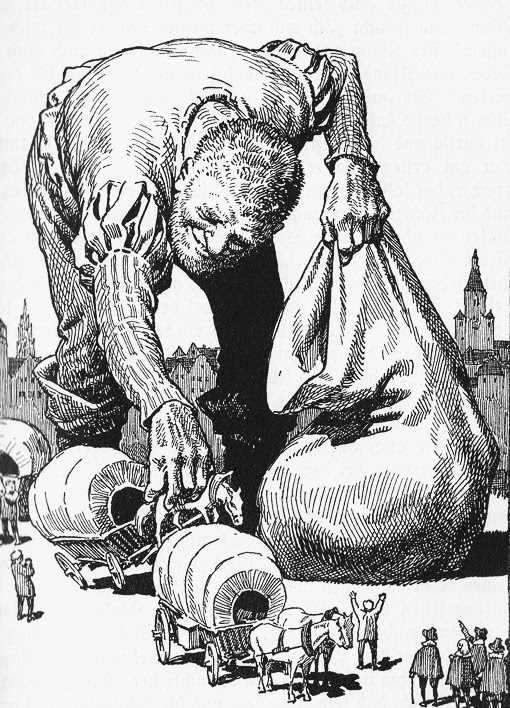
Then, little by little, the King caused all his treasure to be brought thither, and the strong one pushed it into the sack, and still the sack was not half full with it.“ – „Bring more,“ cried he, „these few crumbs don’t fill it.“ Then seven thousand carts with gold had to be gathered together in the whole kingdom, and the strong one thrust them and the oxen harnessed to them into his sack. „I will examine it no longer,“ said he, „but will just take what comes, so long as the sack is but full.“
When all that was inside, there was still room for a great deal more. Then he said, „I will just make an end of the thing. People do sometimes tie up a sack even when it is not full.“ So he took it on his back, and went away with his comrades. When the King now saw how one single man was carrying away the entire wealth of the country, he became enraged, and bade his horsemen mount and pursue the six, and ordered them to take the sack away from the strong one.
Two regiments speedily overtook the six, and called out, „You are prisoners, put down the sack with the gold, or you will all be cut to pieces!“ – „What say you?“ cried the blower, „that we are prisoners! Rather than that should happen, all of you shall dance about in the air.“ And he closed one nostril, and with the other blew on the two regiments. Then they were driven away from each other, and carried into the blue sky over all the mountains one here, the other there.
One sergeant cried for mercy. He had nine wounds, and was a brave fellow who did not deserve ill treatment. The blower stopped a little so that he came down without injury, and then the blower said to him, „Now go home to thy King, and tell him he had better send some more horsemen, and I will blow them all into the air.“ When the King was informed of this he said, „Let the rascals go. They have the best of it.“ Then the six conveyed the riches home, divided it amongst them, and lived in content until their death.
 Learn languages. Double-Tap on one word.Learn languages in context with Childstories.org and Deepl.com.
Learn languages. Double-Tap on one word.Learn languages in context with Childstories.org and Deepl.com.Backgrounds to fairy tale „How Six Men got on in the World“
„How Six Men Got on in the World“ (also known as „The Six Servants“ or „Sechse kommen durch die ganze Welt“) is a German fairy tale collected by the Brothers Grimm in their famous anthology „Grimms‘ Fairy Tales“ (Kinder- und Hausmärchen). The story is listed as tale number 71 in the collection.
The tale follows a young soldier who, after being discharged from service, encounters six men with extraordinary abilities. These men decide to join the soldier on his journey to seek his fortune. They embark on a quest to win the hand of a princess, who sets seemingly impossible tasks for her suitors. With the help of the six men and their unique skills, the soldier is able to complete the tasks, marry the princess, and ultimately become king.
The backgrounds of this tale, as with many of the Brothers Grimm stories, can be traced to oral storytelling traditions in European folklore. These folktales were passed down through generations before being collected, transcribed, and published by the Brothers Grimm in the early 19th century. The tale’s themes of teamwork, loyalty, and overcoming adversity through the use of one’s unique talents are common motifs in folklore and fairy tales. „How Six Men Got on in the World“ is a prime example of a story that combines these elements to create an engaging and memorable narrative.
The tale showcases themes of unity, teamwork, resourcefulness, adaptability, and the triumph of the underdog, making it an engaging and thought-provoking story. While the exact origins of the story are uncertain, it is part of the rich European folklore tradition, reflecting the values and morals of the time and place in which it was collected.
Interpretations to fairy tale „How Six Men got on in the World“
„How Six Men Got on in the World“ from Brothers Grimm can be interpreted in various ways, focusing on different themes and morals. Here are a few interpretations of the tale:
Unity and teamwork: The story emphasizes the importance of unity and teamwork. The protagonist and his companions each possess unique abilities, and when they come together, they are able to overcome various challenges. This demonstrates that individuals can achieve more by working together and combining their strengths. The story demonstrates the importance of working together as a team. The six men, each with their own unique abilities, join the soldier in his quest, and together they are able to overcome the seemingly impossible tasks set by the princess. This interpretation emphasizes the idea that when individuals with different skills come together and collaborate, they can achieve great things.
Resourcefulness and adaptability: The protagonist is a resourceful and adaptable character. After being dismissed from the army with little reward, he decides to make the best of his situation by recruiting talented individuals to help him. As the story progresses, the group continually adapts to the obstacles they face, whether it is winning a race or outwitting a deceitful king.
The power of extraordinary talents: The tale highlights the importance of recognizing and utilizing one’s unique talents. Each of the six men possesses an extraordinary ability that sets them apart from ordinary individuals. By combining their abilities, they are able to achieve great feats and overcome powerful adversaries.
Greed and its consequences: The king and his daughter exhibit greed and selfishness, attempting to get rid of the six men after the protagonist wins the race. Their actions ultimately lead to the loss of their kingdom’s wealth. This theme serves as a warning against the dangers of greed and the potential consequences of pursuing one’s desires at the expense of others.
The underdog’s triumph: The protagonist and his companions can be seen as underdogs, with their humble backgrounds and the initial dismissal of the protagonist from the army. Despite their modest origins, they manage to outsmart a powerful king and gain wealth and happiness. This theme celebrates the ability of seemingly ordinary individuals to achieve great things when they put their minds to it.
Loyalty and Friendship: Another interpretation of the story highlights the significance of loyalty and friendship. The six men, despite their extraordinary powers, choose to follow and support the soldier, showcasing the importance of standing by one’s friends and being loyal to those who have supported you in return.
Overcoming Adversity: The tale also teaches the value of perseverance and overcoming adversity. The soldier and his companions face numerous challenges, but they never give up. By working together and utilizing their unique talents, they are able to overcome the difficulties and eventually succeed in their quest.
Individuality and Uniqueness: The story revolves around a former soldier who, after being dismissed from the army with only three farthings, decides to seek his fortune with the help of people with extraordinary abilities. He encounters five individuals with unique talents, and they form a group that overcomes various challenges and adversaries, including a deceitful king. The story also celebrates individuality and the unique talents that each person possesses. Each of the six men has a special skill that contributes to the group’s success. This interpretation suggests that individual strengths, when combined, can create a powerful force to achieve a common goal.
Resourcefulness and Cunning: The soldier and his companions use their skills and wits to overcome the obstacles and complete the tasks set by the princess. This interpretation highlights the importance of resourcefulness and cunning when facing challenges, as well as the value of thinking creatively and strategically.
These are just a few interpretations of „How Six Men Got on in the World.“ The tale serves as a timeless reminder of the importance of teamwork, loyalty, and perseverance in the face of adversity.
Adaptions of the fairy tale „How Six Men got on in the World“
„How Six Men got on in the World“ is a German fairy tale collected by the Brothers Grimm, Jacob and Wilhelm. The Brothers Grimm were German academics, philologists, and researchers who collected and published hundreds of folktales and stories during the 19th century. Their work, known as „Grimm’s Fairy Tales“ or „Children’s and Household Tales,“ has become an essential part of Western folklore and storytelling tradition. Adaptations of „How Six Men Got on in the World“ from the Brothers Grimm are relatively scarce compared to other well-known tales in their collection. However, there have been a few adaptations and retellings of the story in different formats:
Films: „The Six Servants“: This is a German animated film from 1966 that is based on the „How Six Men Got On in the World“ fairy tale. The film follows six servants who embark on a journey to help their young master win the heart of a princess. „The Magic of the Six“: This is a Russian animated film from 1984 that is based on the same fairy tale. The film follows six friends who set out to find a treasure, and they encounter various obstacles along the way. „Six Men and a Wedding“: This is a modern retelling of the fairy tale, set in India. The film follows six friends who must overcome various obstacles in order to attend a wedding.
Literature: The story has been retold in various fairy tale and folklore collections, sometimes with slight variations in the plot or character details. For example, the tale has been included in the „Blue Fairy Book“ by Andrew Lang, published in 1889, under the title „The Six Sillies.“ – „The Six Sillies“: This is a British folk tale that has similarities to „How Six Men Got On in the World.“ In this version, a man must prove to his girlfriend’s father that he is not a fool, so he sets out to find six sillies who are even more foolish than he is.
Audio Recordings: Some audio recordings and audiobooks featuring the tale have been produced, making it accessible to audiences who prefer listening to the story rather than reading it.
Theater and Puppet Shows: Adaptations of the story have occasionally been performed as plays or puppet shows, especially for children. These performances often simplify the plot and emphasize the themes of teamwork and friendship.
Educational Materials: The story has been used in educational materials to teach important life lessons, such as teamwork, loyalty, and the value of individual skills. The tale can be found in various lesson plans, study guides, and other educational resources.
While „How Six Men Got on in the World“ may not have received as many adaptations as some other Brothers Grimm tales, it remains a charming and meaningful story that continues to be shared through various mediums. Overall, while there have not been many direct adaptations of „How Six Men Got On in the World,“ the themes and lessons of the story have been echoed in various other works of literature and film.
Summary of the plot
„How Six Men got on in the World“ is a Brothers Grimm fairy tale about a man who, after being dismissed from the army, decides to seek his fortune with the help of five extraordinary individuals. The protagonist recruits a strong man who can uproot trees, a huntsman with unparalleled aim, a man who can control wind, a fast runner, and a man who can control the weather.
When the group arrives in a kingdom, they learn of a race where the prize is marriage to the king’s daughter. The protagonist allows the fast runner to compete on his behalf. Despite some setbacks, the runner wins the race, but the king and his daughter are unhappy about the arrangement. They attempt to kill the six men by trapping them in a room with a red-hot iron floor, but the man who can control the weather saves them by creating a frost.
The king then offers the protagonist gold in exchange for giving up his claim to the daughter. The protagonist agrees, asking for as much gold as his strong companion can carry. The king gathers an enormous amount of gold, but it barely fills the sack the strong man carries. The group leaves with the kingdom’s wealth, angering the king, who sends his soldiers to retrieve the gold. However, the man who controls the wind easily blows them away, and the six men return home, where they divide the riches and live contentedly until their deaths.
Informations for scientific analysis
Fairy tale statistics | Value |
|---|---|
| Number | KHM 71 |
| Aarne-Thompson-Uther-Index | ATU Typ 513A |
| Translations | DE, EN, DA, ES, FR, PT, IT, JA, NL, PL, RU, TR, VI, ZH |
| Readability Index by Björnsson | 33 |
| Flesch-Reading-Ease Index | 80.6 |
| Flesch–Kincaid Grade-Level | 7.6 |
| Gunning Fog Index | 10.1 |
| Coleman–Liau Index | 7.2 |
| SMOG Index | 8 |
| Automated Readability Index | 8.1 |
| Character Count | 10.704 |
| Letter Count | 8.100 |
| Sentence Count | 93 |
| Word Count | 2.075 |
| Average Words per Sentence | 22,31 |
| Words with more than 6 letters | 221 |
| Percentage of long words | 10.7% |
| Number of Syllables | 2.541 |
| Average Syllables per Word | 1,22 |
| Words with three Syllables | 64 |
| Percentage Words with three Syllables | 3.1% |

